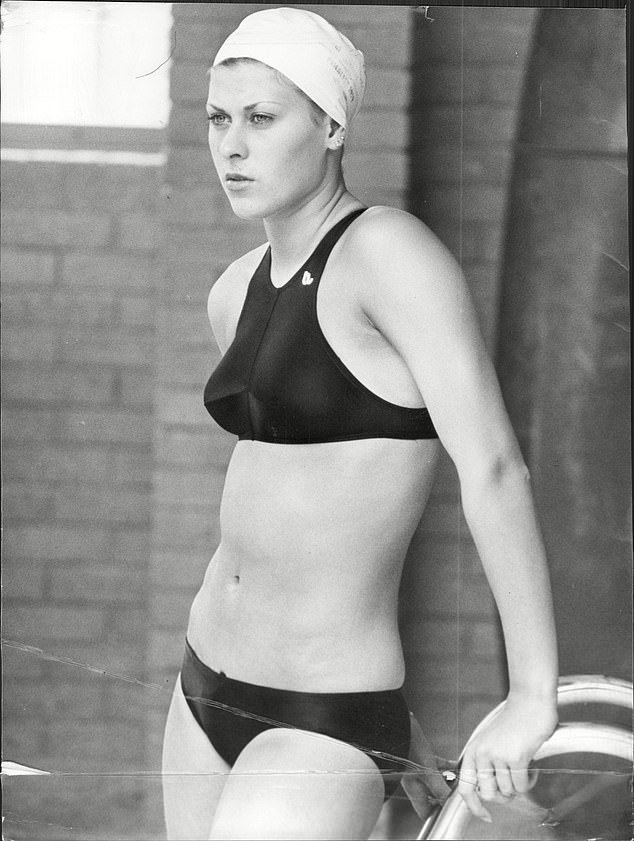A week today, when I stand poolside in Paris interviewing fellow Olympians in my own sport – swimming – for the BBC, I will share their elation, frustration, triumphs and tears.
At Tokyo in 2020, Team GB swimmers had their best Olympics in 100 years, bringing home eight medals, four of them golds. If we top that in Paris, my pride will be boundless.
I’ll be thrilled if Adam Peaty secures a British record-breaking third consecutive 100 metres breaststroke gold, if the inestimable Duncan Scott wins that elusive individual gold he covets so much, and if unassuming Ben Proud takes home his first Olympic medal and becomes the fastest man on water.
I’ll also have my eye on World Champion Matt Richards hoping he and his GB team mates will secure a world record in our men’s 4×200 metres freestyle relay. In fact, all our relays are in contention for medals.
And of course I’ll be cheering on our up-and-coming women’s team knowing, first-hand, that their talent is matched by hard work and self-sacrifice. Many will be setting their sights on Los Angeles in four years’ time.
But I will also be applauding fairness. I am pleased to say that, today, our elite female swimmers will not be conned out of medals by cheats.
But, shockingly, some athletes still are. And I believe cowardice and misanthropy lies behind this.
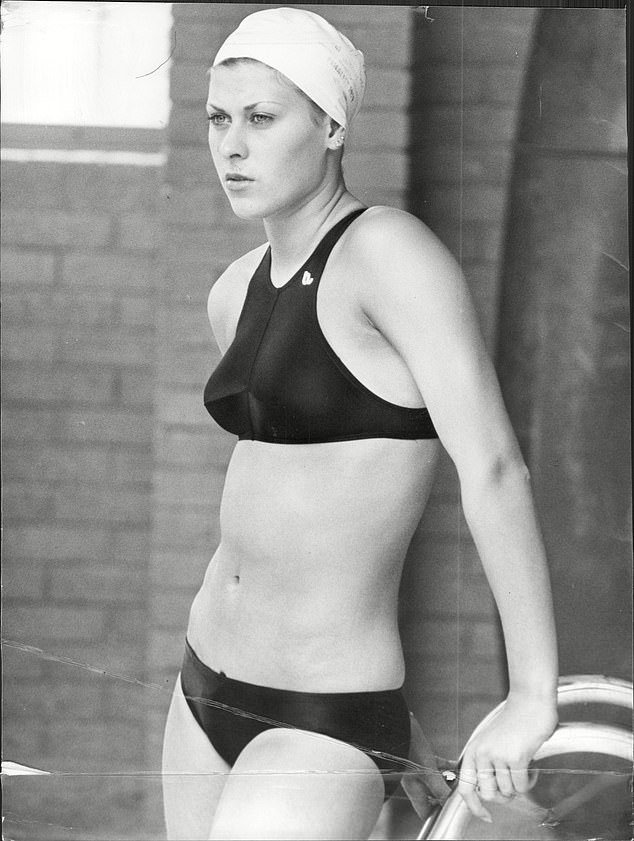
Sharron Davies won gold and silver medals in her Olympic career before going into sports broadcasting
To explain, let me go back to my own days as an Olympic swimmer. In 1980, I missed out on a gold medal in Moscow, coming second behind an East German swimmer whose victory was drug-enhanced.
Although I was on top form for the 400m medley final, I knew it wouldn’t be enough to win. Everyone did. It was evident from the masculine shape of the female competitors from the German Democratic Republic (GDR) that they were on illegal drugs.
So I lost out on the ultimate sporting accolade because the GDR had institutionalised doping. It was cheating on an industrial scale to create the most successful medal factory in Olympic history.
The crime began when a group of men discovered that, if they could make a female more masculine, the chances of her beating other women in speed and strength sports was almost assured.
So the GDR administered the male hormone testosterone routinely to female athletes, some as young as 11. These girls were pawns in a criminal game. They were given no choice but to take the banned little blue pills and, although they conferred explosive strength and stamina – making them virtually invincible – long-term they wrecked their physical and often mental health.
So when I swam against Petra Schneider – for whom I have only immense sympathy – it was, one commentator has said, as if a nuclear torpedo was racing a dolphin. The improbably fast German national record she set has yet to be beaten, 44 years on.
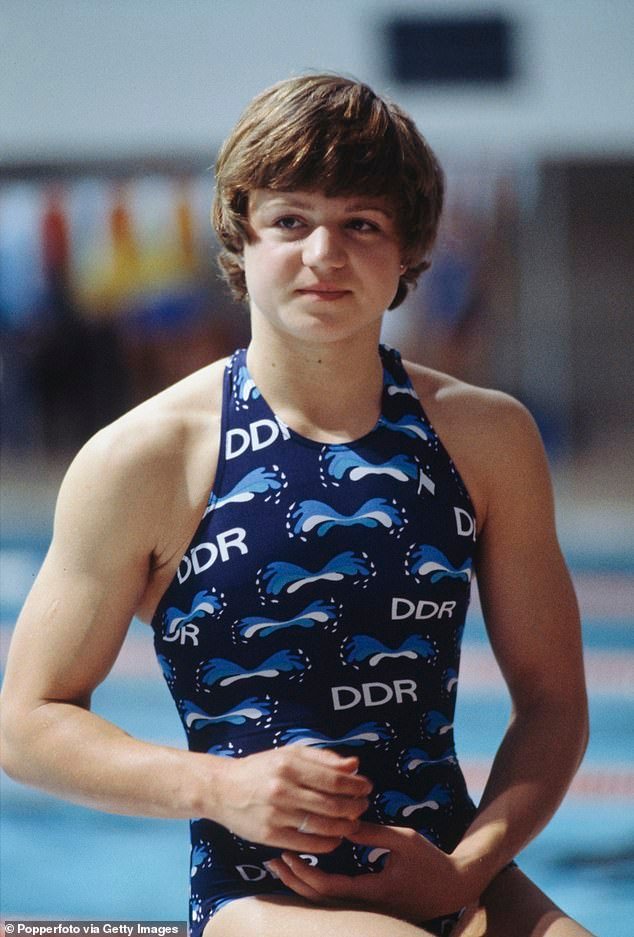
East German swimmer Pera Schneider pictured at the 1980 Olympics
Of course, even today this flagrant injustice still rankles. I, and many other female athletes, have missed out on prestige and career opportunities – and the acclaim that goes with them – because we were wrongly denied our proper place on the podium.
I have friends who finished fourth behind three East Germans and no one remembers their names. Their whole lives would and should have been different.
And this injustice has been compounded by the supine International Olympic Committee (IOC) that just wasn’t interested in finding ways to stop it – even after the fall of the Berlin Wall in 1989, and the uncovering of the scale of the doping scandal through documents and subsequent court cases.
You might think an outrage of this magnitude would be enough to insure against another. You’d be wrong. Because, as I outline in my book Unfair Play: The Battle For Women’s Sport, a similarly gross injustice is taking place in female sport today.
I have been viciously vilified and endured death threats against me and my family. I’ve lost work and valuable sponsorship, while charities I’ve supported for years have dropped me as their ambassador – all for pointing this out.
But the inequality is too important to ignore: the growing prevalence of transgender women (males who identify as women) competing in female sport today, from grassroots to elite level, is an outrageous affront to an already disadvantaged minority – which sounds odd when females are 51 per cent of the population but we have nowhere near parity in sport with men.
I have no compunction about referring to transwomen as biological males because this is what they are. There are only two gametes, two sexes: male and female.
That said, I have absolutely no personal animus against anyone being their authentic self. I want everyone to participate in sport, just in a category that aligns with their biological sex.
What I fiercely object to is unfairness.
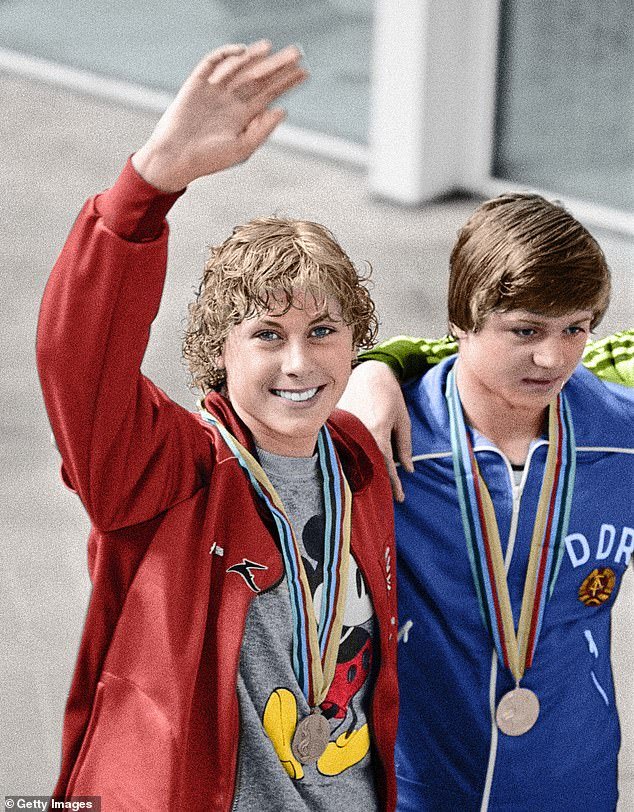
Sharron Davies celebrates her silver medal in 1980 having lost to Petra Schneider
It began as far back as the late 1990s when the IOC, against the wishes of female athletes, removed sex screening.
Then it was compounded in 2015 when the IOC removed the obligation for male athletes who identify as women to have sex reassignment surgery.
Self-identifying males in some cases just suppressed their testosterone levels – often up to ten times that of females – and they could take part in women’s sports and assume their places in the female locker room. To compound this injustice they had already been through male puberty.
As a result, far more transwomen saw Olympic sport as a viable option. Of course they did. They won races. Average male athletes usurped elite women on the podium, taking prize money and accolades, as well as beating records that rightfully belonged to females.
And these athletes are still winning races now, especially in North America.
What is mind-blowing is the complete absence of any kind of scientific rigour underpinning the IOC’s totally false assertion that transwomen have no inherent physical advantage over biological females. If that were true, why bother to have separate categories for men and women at all?
Let’s examine the facts: 97.5 per cent of men are stronger than women. Men punch 160 per cent harder, kick harder, run and swim faster, and that biological advantage is not fully lost when you reduce testosterone levels.
Female footballers get up to six times more knee injuries than males, who have a very different Q angle from hips to knees, allowing them the cadence to convert to more speed and power. This never changes.
At Olympic level the difference in performance is 10-30 per cent which is huge when races are won by millimetres. And the more explosive the event, the greater the advantage in being male.
Studies still show a huge difference in grip strength between transwomen and biological females – and this does not disappear when you suppress testosterone.
I believe it is an abomination that we do not protect our female athletes who are already beleaguered by inequality.
Only 1,000 women in the UK earn their living from sport compared to 11,000 men. Women are paid a fraction of what men earn, too. And now women are supposed to move over to accommodate males who identify as women. Why is it always women who are forced into giving up their hard-won opportunities?
I concede that progress has been made among domestic federations to protect women’s sports for females only. Swimming and rugby have been trailblazers: World Aquatics and World Rugby were among the first to set things right.
International Weightlifting Federation (IWF), World Netball, World Athletics, World Cricket and World Cycling also endorse fair sport participation.
But there are anomalies. While The International Cricket Council has stepped up to the mark, the England and Wales Cricket Board (ECB), ridiculously, has not followed suit.
They still allow fully grown males, identifying as females, to bowl at teenage girls despite the risk of serious injury.
Just seven out of 19 key Olympic sports protect females from unfair male advantage because the IOC essentially allows each sport to set its own rules.
One example is the International Hockey Federation. The sport has already recorded shocking injuries yet it fails to protect its women athletes. And neither does the even more dangerous sport of ice hockey.
Other international bodies governing basketball, fencing, gymnastics, surfing, volleyball, archery, triathlon, football and even more alarmingly, combat sports like wrestling and most martial arts, are still not protecting the rights of their female athletes to compete fairly or safely.
There are still more injustices: if a trans athlete is tested with higher than permitted testosterone levels they are banned for a year. A female would get a four year ban. It is unfair and it’s madness.
In Olympic boxing there is ambiguity about whether biological males will be allowed to fight females.
Interestingly, a transman – a biological female – from the Philippines will be competing, fighting other females. If they didn’t they wouldn’t make the men’s team. That’s fine. No female I know has an issue with this, providing no banned substances are being taken.
But if males, no matter how they identify, are allowed to fight females, the combat sports federations would, in my view, be guilty of gross negligence, given the vastly superior strength and power of male-born fighters.
The IOC, in its bland pronouncements about inclusion and non-discrimination, still discriminates against females and stubbornly fails to take note of scientific fact.
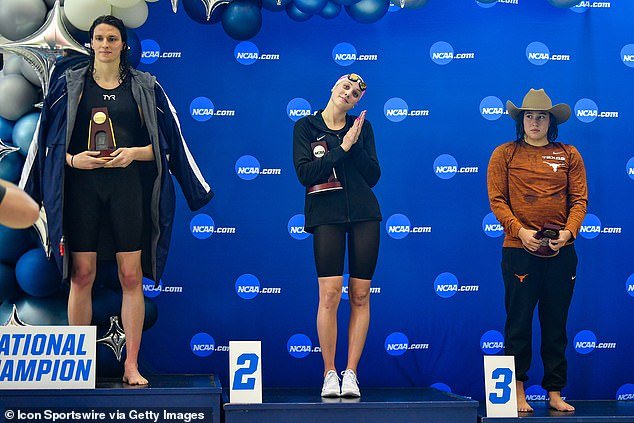
Transgender swimmer Lia Thomas, left, won the 500 freestyle final ahead of Emma Weyant and Erica Sullivan at the NCAA Swimming and Diving Championships in 2022 in Atlanta, Georgia
A recent paper by 26 eminent sports scientists is unequivocal: it stats that the IOC’s framework on gender identity and sex variations is ‘misaligned with current scientific and medical evidence’ and does not adequately protect fair competition for female athletes.
These findings coincide with a BBC survey that shows female athletes feel marginalised, ignored and bullied.
The subjugation of women in sport happens not just at elite level but at grassroots, too. Imagine how swiftly it would stop if females could take a magic pill that allowed them to beat men!
In January 2024, Fair Play For Women showed, through personal testimonies across 35 sports, how women have lost their privacy, dignity, safety and performance rankings after men who claimed to be women joined sports.
Most significantly, the research highlighted how women and girls are put off sport when forced to compete with males. Participation numbers are falling as a result.
It is a devastating irony that women – the very group we should be encouraging to take part in sport – have been excluded from their own sex-based category in the name of ‘inclusion’.
The figures speak for themselves. The slowest male in most county championship swimming races in the UK would have beaten the fastest woman. Men are at least 11 per cent faster than women in county athletics races; the 231st man home in the 2023 London Marathon was faster than the female champion.
I have some common sense solutions: taxpayer-funded sports organisations should lose their money if they allow trans-identifying males to compete with females, because they are guilty of deliberate sex discrimination.
I’m 61 now and my days as an elite athlete are long past, but I’m mum to three children – Elliott, 30, Grace, 26 and Finley, 17 – and grandma to Aryia, four, and six-month-old Ovlan – and my concern now is for future generations. I campaign, not just for female athletes the world over, but also for my daughter, my granddaughter and their friends.

Sharron Davies says that at 61 with her days as an elite athlete behind her, her concern is now for future generations
At this time of year I’m besieged with emails from desperate parents concerned that their children’s schools are not segregating girls and boys in sports day races. This seems to chime with the prevailing notion of inclusivity – while actually having the opposite effect.
Winning matters to even the youngest child and if girls are competing against boys – even when they are eight or nine years old – the girls will quickly learn that their efforts will remain unrewarded, that they do not matter; that the boys will always triumph. And this militates against inclusion. Many girls just give up and no longer participate.
I hear, too, from parents who are concerned that their daughters are self-harming, or will be injured because they are forced to play football against boys, and from private gyms and local authority leisure centres where staff feel too intimidated to challenge fully intact trans-identifying males using female changing rooms, often full of young girls.
I am contacted by faith groups, who won’t allow mixed-sex changing and sport. These women are also self-excluding.
We are, however, starting to see incremental shifts in the right direction. A poll of 5,000 people on the trans debate revealed only 19 per cent of Britons supported allowing trans athletes in women’s sport against 57 per cent who did not.
The report found consistent opposition to biological males in women’s sport in every group surveyed, even among those who backed transgender inclusion in other parts of public life.
My own survey on X corroborated this, revealing that 97 per cent of the 60,000 who responded over 24 hours did not want to see biological males in female sport.
It now needs to become law that future attacks on fair opportunities for female athletes will not be tolerated, all decisions will be based solely on peer-reviewed science and mass athlete consultation is obligatory. Women have been dealt a bad hand throughout sports history. It’s time it stopped.
Facts should take precedence over feelings.
There are helpful moves in the political debate, too. MP Kemi Badenoch had consistently supported sex-based rights as does MP Rosie Duffield, applying and reinforcing the provisions of the Equality Act of 2010. It is important, too, that we work across party lines.
Now PM Keir Starmer has stated his support for the women’s category in sport to be ring-fenced for females only, and backs sports organisations taking a stand in support of women.
I’d like to meet him to implore him to enshrine this support in law and extend it from elite to grassroots participation.
Girls stick with sport when they grow up in a healthy, safe and fair environment, and we won’t have the elite female athletes of the future without fairness from the earliest ages.
Unfair Play: The Battle For Women’s Sport by Sharron Davies with Craig Lord, published by Forum, is now out in paperback.

